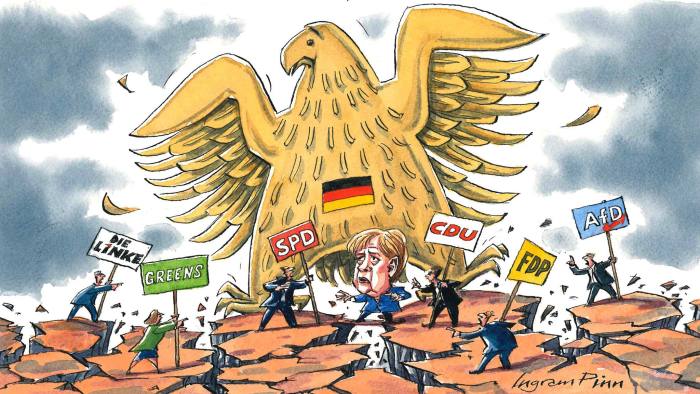The grand coalition formula has reached the end of the road
Tony Barber

Like a married couple who stay together for fear that separation would be too costly, Germany’s ruling “grand coalition” of Christian Democrats and Social Democrats is a partnership empty of love and purpose.
Tensions are rising in and between the two parties that restored German democracy after 1945 and gave the country a prosperity and political stability unmatched in its history.
The frictions are symptomatic of a deeper trend — namely, the fragmentation of the German party political landscape. It is now a six-party system, or one of seven parties if the Christian Social Union, the CDU’s Bavarian sister party, is counted separately.
The impasse demands new, untested types of coalition at national level, especially if the CDU-SPD government were to fall apart. Early elections might produce yet another fall in combined support for the two mass parties of the postwar era.
Such a solution will not be easily found. The system’s unusual feature is that it contains two parties, the rightwing populist Alternative for Germany and the radical leftist Die Linke, each of which is treated like a polecat by the parties of the centre.
In a recent YouGov survey, the first preference of respondents was for a left-of-centre coalition bringing together the SPD, the Greens — whom some polls now make Germany’s most popular party — and Die Linke. However, the latter’s roots in former East Germany and its hostility to German membership of Nato are difficult for its potential coalition partners to swallow.
Germany’s 20th-century history and modern political culture, not to mention the recent sobering experience of watching the behaviour in power of Austria’s far-right Freedom party, completely rule out any role in government for the AfD. Yet the moderate option of a three-way coalition, uniting the CDU with the Greens and liberal Free Democrats, was explored to no avail after the Bundestag elections of September 2017.
Something different, including the option of Germany’s first Green-led government, with a Green chancellor, must be tried. Since Angela Merkel became CDU chancellor in 2005, three of Germany’s four governments have been grand coalitions. This formula has reached the end of the road. Successive grand coalitions have had the effect of sustaining parties at each extreme of the spectrum, just as the former West Germany’s 1966-1969 grand coalition, the first of its kind, drove up support for the student protest movement.
At the same time, Ms Merkel’s unshakeable devotion to consensual centrism has upset CDU conservatives, annoyed SPD leftwingers and made German business ask in frustration what, if anything, the grand coalition stands for.
One telling sign was the sharp exchange at this month’s annual meeting of the BDI, Germany’s powerful industrialists’ group. After Dieter Kempf, the association’s head, accused the grand coalition of losing the confidence of business, Ms Merkel retorted that the industrialists had lost society’s confidence thanks to the car sector’s diesel emissions scandal.
The larger point is that the grand coalition has lost the will to pursue serious economic reforms just when risks to Germany’s business model are rising. These include a Chinese economic slowdown, potential US tariffs on EU car exports, a no-deal Brexit and the outbreak of geopolitical crises around the world.
An ambitious reform programme could start with a shake-up of Germany’s tax systems. For almost 30 years, the government has levied a “solidarity surcharge” on income tax to pay for eastern Germany’s reconstruction after reunification. Like some medieval salt tax enforced long after its original rationale has gone, the surcharge continues to be collected from Germans, even though the funds are no longer allocated specifically to the east.
Germany’s lack of reform is reflected in the erosion of infrastructure, caused by years of under-investment, and high energy prices that damage the competitiveness of companies. Low unemployment disguises the fact that many service sector jobs are poorly paid, making it harder for some Germans to make ends meet than outsiders appreciate.
Ms Merkel stepped down as CDU leader last year, but says she intends to serve a full, four-year term as chancellor before bowing out in 2021. For years she has been all but untouchable, on account of her high international reputation and consistent success in national elections. Yet the CDU’s transfer of power is not going according to plan.
Annegret Kramp-Karrenbauer, the party’s new leader, has made one stumble after another. The more German voters see of her, the less impressed they are. CDU rivals, fearing the worst in the next Bundestag elections, do not want her to be the party’s pick for chancellor.
The SPD may pull the plug on the grand coalition if, as seems likely, the party suffers bad results in September and October in three eastern German state elections. However, a snap national election may simply confirm that voters’ support for the SPD is collapsing around the party’s ears.
Outsiders should not gloat about these difficulties. Germany is Europe’s indispensable pillar of stability, and no one except the west’s adversaries gains from trouble there. But renewal and a change of direction are sorely needed.
0 comments:
Publicar un comentario